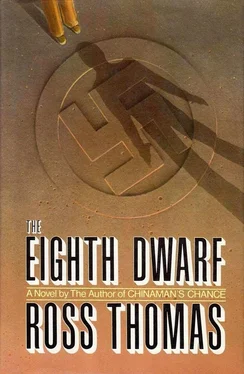Bodden memorized Damm’s name, then filled his pipe with the suspect tobacco that he’d bought on the black market and used the same match to light his pipe and burn the flimsy paper. The Russian was quick, Bodden thought; that much had to be said for him. The man, what was his name — Damm — was killed in Frankfurt only yesterday. The information had to be gathered and then transmitted to Berlin, and from there it had to be redirected to Lübeck. Very quick, very efficient.
He puffed on his pipe and thought about what he must do. There was his job at the Lübecker Post. Well, that was no problem. He simply would not show up. They would check, of course, with his landlady, Frau Schoettle. Tonight he would see her and tell her that he was leaving, that an emergency had come up and that he was returning to Berlin. He would present her with a small gift, perhaps a hundred grams or so of fat. He still had plenty of razor blades left. That had been intelligent of them, to supply him with razor blades. As a form of currency, they were almost as good as cigarettes. He wondered which of his black-market contacts he should see about the fat. Probably the tall, skinny Estonian. He seemed to be the most resourceful. The Estonian might even be able to come up with a little butter instead of lard. She would like that. He would take her to bed first, tell her he had to go back to Berlin, and then give her the butter. He would also give her his ration books. They would be no good to him in the American Zone.
Bodden enjoyed dickering with the tall skinny Estonian. After ten minutes of it, during which time the Estonian had stretched his rubber face into expressions that ranged from grief to elation, they had struck the bargain. In exchange for five brand-new American-made Gillette razor blades, Bodden received a fourth of a kilogram of real butter plus one packet of Senior Service cigarettes. The Estonian had moaned and sworn that he was being robbed, but then his face had stretched into a wide, merry grin. Before the war the Estonian had been a lawyer, and he was, by nature, Bodden had decided, a very cheerful fellow. “This is my courtroom now,” he had once told Bodden, waving an arm grandly at the narrow black-market alley. “Do you enjoy my histrionics?”
“Very much,” Bodden had said.
Frau Eva Schoettle, landlady of the six-room, largely undamaged house where Bodden roomed, was a thirty-three-year-old widow whose husband had been either killed or captured at Stalingrad. Either way he was now of no use to her and her two children, and so she took in roomers, who paid their rent in potatoes or bread or eggs or vegetables or anything else that could be eaten.
Frau Schoettle had twin dreads, one of them being that a British officer would suddenly appear at her door and requisition the house. The other was that her either dead or missing husband might someday return. She had never really liked Armin Schoettle, a big, coarse, loud, humorless man who, before the war, had been a contractor. Although he had built the house and had been reasonably good to their ten-year-old son and nine-year-old daughter, he had been a dull, indifferent lover with questionable personal habits. She had not seen him in four years now, or heard from him in three, and her memory of him had grown dim, almost nebulous. Her one vivid recollection of him was his underwear. She remembered that because he had never changed it more than twice a month. And his smell. She remembered that, too.
By contrast, the printer was a skilled, inventive, even laughing lover with neat habits, and she had gone to bed with him three days after he had moved into the small back room on the third floor, the room that was almost a wardrobe. She lay beside Bodden now on the narrow bed, smoking one of his British cigarettes and thinking about what he had just told her — about his going back to Berlin the next day. She realized that she would miss him. She would miss his lovemaking, of course, but that wasn’t all. She would also miss those wry little jokes that he was always making. The printer was sometimes a very funny fellow. But then, a lot of Berliners were.
She turned to him and smiled and said, “I’m going to miss you, printer.”
“Will you miss me or the eggs I bring you?”
“Both.”
“What else will you miss?”
“This,” she said, and reached for him. “I’ll miss this.”
“Ah, that,” he said, and reached for her cigarette. He put it out carefully in a tray. “Well, that particular item you may borrow one more time, provided, of course, that you return it in reasonably good shape.”
“Reasonably?”
“Reasonably.”
As he made love to her for the second time that evening, she thought fleetingly of what she would have to do next. She would have to leave him and dress and then walk three kilometers to where the British Captain was billeted. For only a moment she thought of not telling the Captain, the one who was called Richards and who always smoked a pipe. She would let the printer go his way. What business was it of theirs? But no. She would tell them. If the printer left and she didn’t tell them, they would take away her house. Too bad, printer, she thought, and clutched him tightly to her.
It was raining the next morning at 6:42 when Bodden boarded the crowded train to Hamburg. It was a cold, hard rain, and Bodden had been caught in it as he had walked from his rooming house to the Bahnhof. But then, so had the other fellow, he thought with a grin, the one who had fallen in behind him just as he had slipped out of Frau Schoettle’s house.
The other fellow was a medium-sized, youngish man with yellow hair that flopped down over his eyes despite the cap that he wore. He looked well fed, or reasonably so, and Bodden wondered whether he was German or English. The man with the yellow hair now stood a few meters away in the packed aisle of the train. For a few moments Bodden toyed with the idea of approaching the man and trying out some of his English that the Pole had taught him in the camp. Something like “A nice day for ducks,” which, the Pole had assured him, both Americans and British said all the time. But then, so did Germans.
No, Bodden decided, with just a tinge of regret, he would ignore him — at least until Hamburg. In Hamburg he would lose the fellow with the yellow hair. He had better lose him, because es geht um die Wurst. The sausage depends on it. He wondered if the Americans said that too, but decided that they probably didn’t.
In the large country house that was located fifteen kilometers north and west of Lübeck, Colonel Whitlock stood at the French doors of the former sitting room that was now his office and stared out at the man and the woman working in the rain.
The man and the woman were in their sixties, and they were digging in a garden that had once been a smooth expanse of carefully rolled green lawn. The lawn was now planted to potatoes. The woman and man who were digging them up were the owners of the large country house. Their name was Von Alvens, and they once had been extremely rich. Now they were extremely poor, as was virtually everyone else in Germany, and they bartered the potatoes that they didn’t eat for lard or eggs or a very rare chicken. They had had four sons, all of whom had been killed in the war. The Von Alvens still lived in the big house, but in a single room in the rear that once had been occupied by a servant.
Colonel Whitlock glanced at his watch and thought, Goddamn the man. This was their third meeting in two days, and each time the Colonel had been kept waiting, sometimes for as much as fifteen minutes. The Colonel was a stickler for punctuality. It was, in fact, almost a fetish with him, and he felt his irritation grow as he stood at the French doors and stared out at the old couple digging in the rain.
Читать дальше












